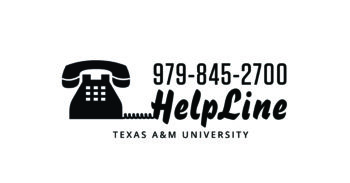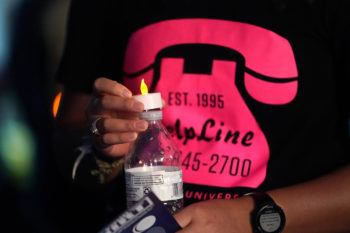HelpLine Volunteers Are Here To Lend A Non-Judgmental Ear

Two summers ago, Maya DeConge was living at home and feeling alone.
COVID-19 cases were surging, and the nation was in unrest after the killing of George Floyd. DeConge, a Texas A&M University public health senior, was experiencing emotions similar to many people at the time.
“I had the urge to put myself in a place where I could help,” she said. “I wanted to be part of something where I could help with the unknowns and the fears and the anxieties that were going on.”
The following January after returning to College Station, DeConge signed up to be a volunteer for HelpLine, the after-hours mental health service staffed by students and supervised by Counseling & Psychological Services (CAPS). When Aggies call the HelpLine number (979-845-2700), waiting on the other end of the line is a fellow student who can provide support.
HelpLine is a confidential and non-judgmental service, DeConge said, and students don’t have to be in an immediate crisis to dial-in. Anxiety, stress, or just a desire to vent are all good reasons to pick up the phone. The line is open weekdays from 4 p.m. to 8 a.m. and 24 hours a day on weekends when classes are in session.
“You can pretty much call about anything – whether you’re really stressed out, or you just really need to talk with someone who will just listen to you, we listen and provide peer support,” DeConge said.
Volunteers complete 55 hours of training before they start taking calls, DeConge said, and have been educated on a variety of issues students may need help with. DeConge and other volunteers pick up about four shifts per month. No two days working the line look the same, she said.
Shifts range from four to six hours, depending on the duration of the conversations. There’s no time limit on calls – volunteers will stay on the line for as long as someone wants to talk.
“It depends on the evening – sometimes we’ll get four to six calls in a shift, and other times just one or two,” DeConge said. “It’s very rare that we get none. Calls can range from anywhere from a few minutes for general referrals on how to access services and programs at CAPS, or they can last an hour or more.”

On average, HelpLine receives about 1,000 calls per year. There are 42 volunteers who work the line this semester, said Susan M. Vavra, HelpLine’s director.
“I have one of the most rewarding positions on the CAPS staff because I remain honored to work alongside some of the best Aggies our campus has ever seen,” Vavra said. “Those who answer the HelpLine provide callers with a nonjudgmental, safe space to talk out anything. That is a beautiful thing to give to another person. We need more kindness and compassion in our world, and having an opportunity to witness firsthand the fierce desire to help others in need that HelpLine volunteers genuinely possess gives me great hope for our future.”
Most of the calls made to HelpLine are related to common problems among college students: things like relationship issues, stress, depression and imposter syndrome.
“It’s like you’re having a conversation you would have with a friend,” DeConge said. “You’re just sitting down and really listening. A lot of times just offering a listening ear is all that someone needs. You barely have to say any words, and they feel better. They just needed to get whatever it is off of their chest.”
DeConge stresses the importance of offering this kind of listening space.
“We have friends who call worried about a particular person and want to know how to help them. We also have people who call who are having feelings of hopelessness or worthlessness,” she said. “We get to talk to them about whatever they want to share with us. As we talk about suicide awareness, a lot of times people who may have these feelings don’t open up about it. I think HelpLine is a really important space for this.”
When it comes to personal struggles, DeConge said, there’s no hierarchy. No matter what someone is going through, their feelings are valid.
“We should all have that space to have someone really listen to us,” she said.
To learn more about HelpLine and how to volunteer, visit the CAPS website.
Media contact: Caitlin Clark, caitlinclark@tamu.edu





